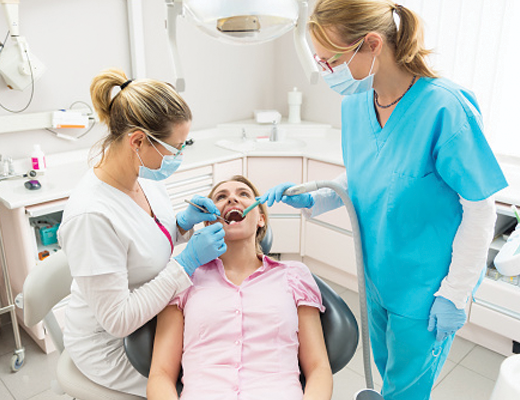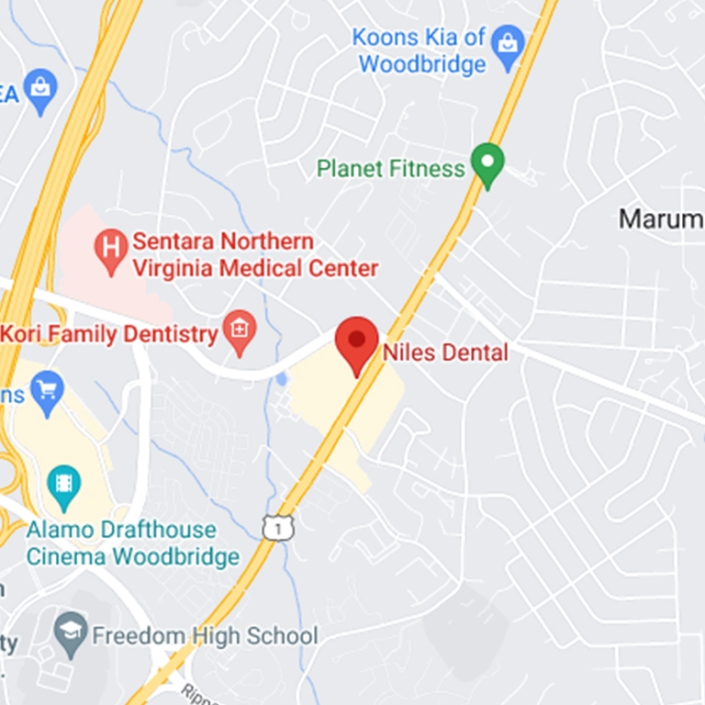TMJ in Woodbridge, VA

Temporomandibular joint disorder (TMD) is a condition that affects up to 12 percent of the adult population. Your temporomandibular joints (TMJ) connect your jawbones to your skull, and you have one on each side of your face. You develop TMD when these joints become irritated due to clenching your teeth, arthritis, a jaw injury, stress, and other factors unique to the individual.
When diagnosing you with TMD, your dentist or doctor will classify it as a disorder of the jaw joints, a disorder of the chewing muscles, or headaches caused by TMD. Regardless of which type of TMD Dr. Raymond Niles or Dr. Kathryn Niles-Smith diagnose you with, we can help you find the most appropriate solutions forTMJ/TMD treatment in Woodbridge VA.
Recognizing the Symptoms of TMD
TMD presents a wide range of symptoms that can make it difficult to pinpoint the problem at first. We encourage you to schedule an exam at Niles Dental right away if you deal with one or more of the symptoms listed below.
- Clicking or popping sounds when you open your mouth
- Ear pain
- Jaw pain or stiffness
- Facial pain
- Headaches or migraines
- Neck pain
- Shoulder pain
- The top and bottom rows of teeth no longer fit together properly
- Tinnitus, or ringing in the ear
Subconscious teeth grinding at night is one of the leading causes of these symptoms. If you are dealing with a lot of stress in your life, we encourage you to reduce or eliminate specific stress triggers if possible or seek counseling to help you better learn to cope with them. When arthritis or a jaw injury causes the symptoms, treating those issues first may be all that is necessary to eliminate your TMD symptoms.
Certain Lifestyle Habits Can Make TMD Symptoms Worse
People sometimes engage in habits without realizing it, which can make their TMD symptoms more uncomfortable. These habits include:
- Chewing on ice
- Chewing on non-food items, such as pens, pencils, and paper clips
- Frequently chewing gum
- Grinding or clenching your teeth during the day
- Poor posture, since the way you sit and stand places added pressure on your facial, neck, and shoulder muscles
- Regularly sleeping on your stomach
- Regularly taking big bites of food because excessive chewing strains your jaw muscles
- Using teeth to open food and drink containers
Untreated TMD can lead to chronic pain, chewing difficulties, worn teeth, daytime fatigue, irritability, and difficulty concentrating due to broken sleep. If you suspect that you have at least some of the symptoms of TMD, contact us to request an exam. We will discuss your best options forTMJ/TMD treatment in Woodbridge VA at your appointment.
How We Diagnose TMD at Niles Dental
Both dentists and doctors can diagnose TMD. However, dentists have more experience dealing with disorders of the jaw and are more familiar with this condition.
The first thing Dr. Niles or Dr. Niles-Smith will do when you come in for your TMD exam and consultation is ask you to open and close your mouth several times in quick succession to check your range of motion. Your dentist will also press on several areas of your mouth and face to determine where you feel the sorest. You can also expect your dentist to place their index and middle fingers from both hands around your jaw joints as you open and close your mouth.
Dr. Niles or Dr. Niles-Smith may also obtain one or more diagnostic images to help confirm what they notice during their visual inspection. Dental X-rays, CT scans, and MRI scans are the most common types of imaging equipment we use to aid us in treatment planning.
Treatment Options for TMD
We offer various treatment options for this disorder, including recommending lifestyle changes and home remedies, prescribing medication, and surgery as a last resort. Dr. Niles and Dr. Niles-Smith always use the least invasive treatment option available first before attempting a different method to reduce or eliminate your symptoms.
Non-Surgical TMD Treatments
Below are several non-surgical treatment methods you can explore to help ease your discomfort from TMD.
- Behavioral changes, such as not chewing on ice or using your teeth to open food and drink packages.
- Mouth guards are worn at night to prevent subconscious teeth grinding.
- Physical therapy exercises to stretch your jaw muscles and joints.
- Trigger point injections, which involve injecting Botox or corticosteroids into your jaw muscles.
- Ultrasound therapy delivers deep heat to the tissues in your face and jaws. The deep heat improves blood flow and encourages the muscles to relax.
- TENS treatment, which stands for transcutaneous electrical nerve stimulation, is a device that sends low-level electrical currents to your jaw muscles.
We might also recommend taking a non-prescription pain reliever, such as ibuprofen, naproxen, or acetaminophen. If these remedies do not appear to offer enough pain relief, ask your doctor for a prescription for a muscle relaxer or an anti-depressant. We have found that both medications work well to reduce the symptoms of TMD.
Surgical Treatments for TMD
When medication and non-surgical treatments fail to provide relief, the next step is for Dr. Niles or Dr. Niles-Smith to perform a procedure known as arthrocentesis to determine why your jaw joints feel sore. Your dentist can also remove fluid from around the jaw joints to relieve your symptoms. Other surgical options for TMD include open-joint surgery or TMJ arthroscopy.
With the first type of oral surgery, your surgeon makes a long incision across the jawbone and then adjusts it to improve your comfort. The TMJ arthroscopy procedure involves your oral surgeon making a small incision just under your ear and inserting a thin tube with a light and camera attached. The opening makes it possible for your oral surgeon to insert surgical instruments that allow him or her to reshape bones, reposition your jaw disc joint, and remove scar tissue.
Don’t Suffer Another Day
With so many options forTMJ/TMD treatment in Woodbridge VA, there is no reason that symptoms of this disorder need to upend your quality of life. Please reach out to Niles Dental today to request a consultation to discuss TMD symptoms and treatment options. We look forward to helping you feel better soon.

